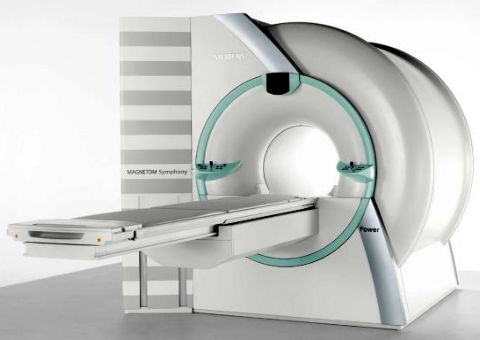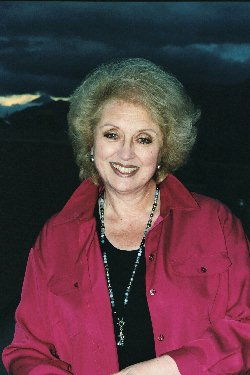|
The Musician's Guide to Having an MRI

In an occasional series 'The Musician's Guides',
JENNIFER PAULL offers a few tips for survival
when confronted with being the square
musical peg in a round musical hole
I am a part of all that I have met.
-- Alfred, Lord Tennyson, English poet (1809-1892)
Being a musician has many disadvantages. These range from being permanently misunderstood by one's family more often than not, to the physical aches from playing whatever one does: the penury of sufficient, regular lifetime income and the superfluity of general angst on all possible fronts. These suffice to begin a lengthy mental list. Flute players develop tennis elbow with remarkable regularity and those sitting in front of the brass section go deaf or are plagued by tinnitus. We tend to expand not only a professional deformation in our outlook upon the Arts in general and the world in particular, but most of us, sooner or later, bear a resemblance to (or behave as) our instruments in some way -- rather like dog owners; an occupational hazard.
Having established that the musician is, therefore, not like the rest of humanity, be wary of those places that might cause insanity (subito). I can think of few more mentally exhausting than any in which one is bombarded by the thuds and ear-splitting inevitability of today's over-loud pop music. I swim against the tide, as most of us are wont.
I refuse to eat in a restaurant in which food is served to the faint, interrupted strains of some poor soul playing a piano in a corner, or in which piped noise is supposed to set an 'atmosphere'. Heaven preserve us from a non-musician's taste in presumed ambience!
If the supermarket pipes it in, I pipe myself out. The above is all very well as a standpoint for the 'classical' musician when thrown into the modern world, but what on earth does (s)he do when thrown into an MRI?
A white-clad person may offer bromide earphones oozing recordings of the above. One may even have been informed that bringing one's own CD is acceptable. On the other hand, depending upon the country/health service or amiability of all concerned, there may be no soft option. Good! None is required by the musician.
Here, for a change, we have a most decided advantage. I must admit that having synaesthesia I, perhaps, have a tad more luck on my side. However, I promise you that sans the latter blessing, the musician is well prepared for the mini Channel tunnel and what could be a claustrophobic hour or two.
The magnetic resonance imagery settings come in series (ranging from two to seven minutes), each having a different sound, pitch(es) and rhythm depending upon the particular machine and the specific examination. An American impressionist tone poem is not the same thing as an architecturally correct German fugue after all. Neither are these multi-million, cylindrical, wide-bored, electronic instrumental treasures from their respective countries. In fact, only a quartet of makers/countries is represented in this advancement in diagnostic technology. (The other two being Japanese and, originally, Dutch, drawing musical parallels would render me even more obtuse than usual.)

Jennifer Paull's iPod
|
Were I to have been listening to Albinoni's 'Adagio' on my own specially imported CD (a 'composition', as we know, that had precious little to do with its alleged composer -- see Adding to Adages about Adagios), I would have fused the equipment with clouds of anguish (well, I'd most probably have fused it anyway, but that would have been my purist's soul screaming for Albinoni Lib), as peace would most decidedly be shattered by the switching on of the aforementioned apparatus. (I have often longed to call certain instruments just that -- the ophicleide, the contrabass sarrusaphone, the piccolo Heckelphone, the xylorimba, the telharmonium ...) Any poignant, harmonic musical tension would have been blown to smithereens by a consort of drunken sledgehammers with pile driver obligato. That sounds worse in German (not surprisingly): Vorschlaghämmer with Bodenstampfer obligato. I would naturally think so as I was inside a Siemens 'Symphony' model (as opposed to the General Electric, Toshiba or Phillips). I assure my incredulous readers that the German makers do give musical names to their models. Yet another non-musician's taste in presumed ambience, no doubt. Perhaps 'Minuet' would be a useful idea for naming a tank?
Repeating Fritz Spiegl's poem to the rhythm of the one-man-band inside which one is cocooned would not be a bad idea, however.
The Adagio of Albinoni
Is largely phoney
And is a musical risotto
Cooked up by Giazotto.
The answer is to surrender to musical memory. Musicians have a mental library of scores and jingles, TV themes and film music, factory sirens, even the screeching of car brakes subconsciously amassed, not by choice, but by training and living life. We listen, we store, we remember. Our past sound experiences are filed on mental CDs that a sudden violent jerking of rhythmical sound makes resurface. Rhythm and pitch are the keys to every personal archive.
I shut my eyes before going into the contraption because there are no confines to the imagination. I can fly through space and time growing mental wings -- dance like the most agile of dancers, figure skate upon imagery ice and dive into turquoise lagoons.

Jennifer Paull - a square musical peg in a round musical hole?
|
'Bong, bong, bong, bong' -- kicks in. After a moment I hear not only its note, but delight in discovering the fundamental's harmonics -- easily discernable. I 'see' a shape for each sound. But, before I can even analyse what I am 'seeing' or hearing, something jumps up from a deep memory archive and fills my brain. A long-forgotten pop song of the 1960s invades me. I can't even recall the title, but it must have had this exact same tempo and pitch. Yes, well, in the 1960s one could listen to pop music by and large, it wasn't so -- well, so -- loud.
The note changes: it's slower and I see horizontal lines in greyish white. Mendelssohn, a section of the Violin Concerto pours in. I have no say in the matter -- the personal archive fills the gap. What a marvellous thing memory is! I lie with my eyes shut just 'watching' and listening to 'MRI Island Discs'.
Sometimes sounds overlap. That's the tough part. I try to figure out how I'd be writing them down in relation to each other. Is that bilateral overlap compound to simple time, or, if taken at larger magnification, are we simply using the odd duplet, perhaps -- or triplet, maybe? What a good thing it is I'm not listening to a recording and trying to relate one insistent external rhythm to another. Bring your own CD to an MRI examination? What an idea, but what mental escape one's theory lessons can bring. Imagining this is dictation and that one has to write it down, or fail, can make one mighty grateful that this is only an MRI and not a degree examination.
A musician can find it difficult to comprehend that one sound may have no connection to another. Our training preconditions us to surmise that it does. I mused about the signature tune for 'Inspector Morse' recently, wondering how the combined melody and Morse code linked on paper. I asked a composer friend whose wife had sung in the background music of the series. 'It doesn't', he said. 'One is music and one is Morse code'. I was not expecting that obvious morsel of common sense.
So, when in situ inside the nice and friendly contra-MRI-phone, just enjoy the mental exercise of trying to notate the crashes and bangs. (I do recommend ear plugs, which render them bearable.) Let the musical memories flow and, believe me, they will. I have performed in many contemporary concerts and attended many a music festival, the percussion sections of which have been far less mellifluous than this! Perhaps the MRI has a musical future? Maybe Japanese wind chimes can have a new Japanese electronic extension? Is the Donaueschingen Festival aware of the possibilities?
The past is a foreign country; they do things differently there.
-- L P Hartley, English writer (1895-1972)
True -- medical science has advanced apace and those with perfect pitch and knowledge of metronome settings can allow themselves endless revelry. Not so very long ago the musician would not have had such a treat in store -- back in the days of X-Rays, ultra sound, scanner and stethoscope.
To my daughter, Nathalie (whose chosen pathway in life is to specialise in, operate, programme and analyse the fruit of these beasts), with my respectful homage to Pierre Boulez for having composed 'Le Marteau sans maître' ('The hammer without master', first performed at the 29th Festival of the International Society for Contemporary Music in Baden-Baden 1955) without ever having imagined that there would, one day, be a hammer -- with!
Copyright © 3 November 2008 Jennifer I Paull, Vouvry, Switzerland
 JENNIFER PAULL'S AMORIS INTERNATIONAL AND AMORIS IMPRINT
JENNIFER PAULL: RED HERRINGS SPAWN IN ROUGH BLOGOON WATERS
BASIL RAMSEY: A STROKE PATIENT OFFERS HELP TO OTHERS
JENNIFER PAULL'S AMORIS INTERNATIONAL AND AMORIS IMPRINT
JENNIFER PAULL: RED HERRINGS SPAWN IN ROUGH BLOGOON WATERS
BASIL RAMSEY: A STROKE PATIENT OFFERS HELP TO OTHERS
|

